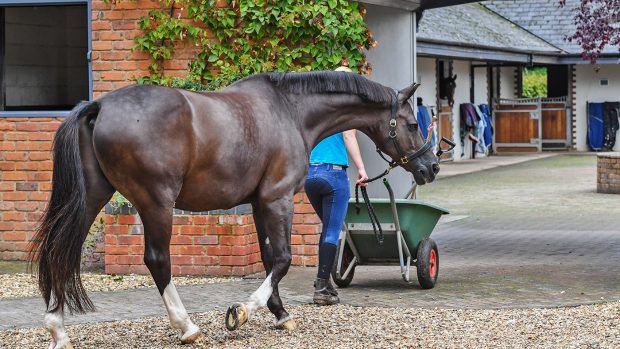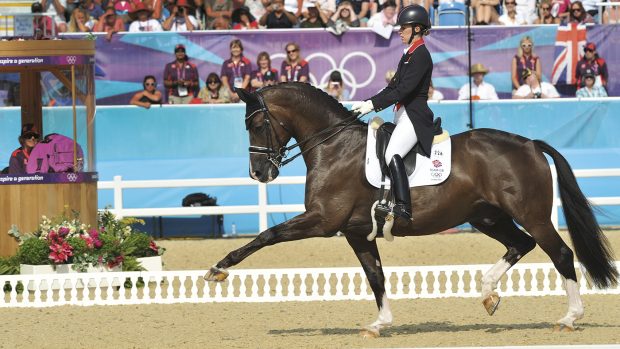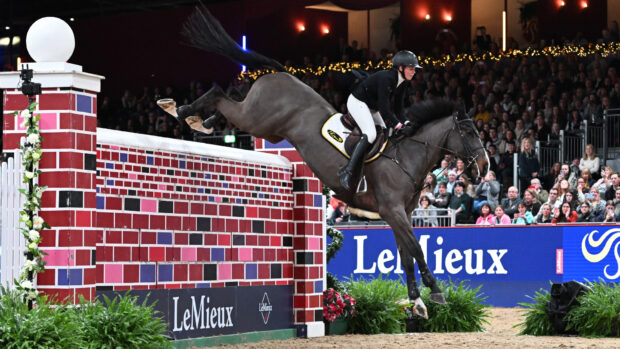Carl Hester has triumphed in more competitions than any other British dressage rider and his collection includes Olympic medals of all shades. With the Paris Olympics just around the corner, what is it that keeps this brilliant trainer and rider motivated to continue week-in, week-out? Some might be surprised to learn that it is not the chance of adding to his impressive medal collection.
“Competitions don’t drive me – they are not my reason for getting up,” says Carl. “I just really like training the horses. I don’t feel I have unfulfilled ambitions; I am just happy to ride. If I have a horse next year, and it’s all working out I would love to [ride at the Paris Olympics]. It does take commitment and I’ve prepared for that. But anything can change at any time and if it did, I would not feel unfulfilled.”
Carl Hester: a true inspiration
Among the many reasons that Carl is such a huge inspiration to riders around the world is that he did not come from a horsey family, growing up on the small British island of Sark, located off the south coast in the English Channel. He has worked hard on his way to his current situation and says he feels privileged to live the life he does.
“I’ve been one of those lucky ones, particularly coming from a non-horsey background,” he says. “It’s taken years to get here, with my own yard and owning my own horses. But the fact that I can walk out of my door and ride – that’s enough!”

Carl Hester riding En Vogue at home in his outdoor arena.
His horses are the equestrian equivalent of jet setters, flying around the globe to take part in World Championships, Europeans and Olympics Games, but at home they lead a very normal life, as has been widely documented.
“I believe in a varied life for horses,” says Carl. “We only work them four days a week in the arena and the rest of the time is based on fitness, hacking, hill work and turnout.” He has always taken this approach because “it’s just the way I learnt how to look after horses”. Carl grew up on the small Channel Island surrounded carriage horses. “There were no stables, they all lived out, they all worked all summer and seemed to manage pretty well.”
Some in the equestrian world are surprised that elite grand prix dressage horses can live a similar life to those carriage horses in Sark, although understanding the importance of giving all horses access to freedom, forage and friends is becoming more widespread. Carl says: “It sometimes seems quite unreal that you are having conversations about the fact you keep horses in the way that nature intended. It feels weird that people are surprised you could have a team horse like Vogue who actually lives out.”
While giving horses plenty of field time is among Carl’s key philosophies, he tailors this to what works best for the individual horse: “If the horse is a particularly very laid-back character and they live out at night, they tend to have less energy for riding – so those horses might go out in the day. Those with hot temperaments and a big work ethic – they would be better horses for living out overnight.”
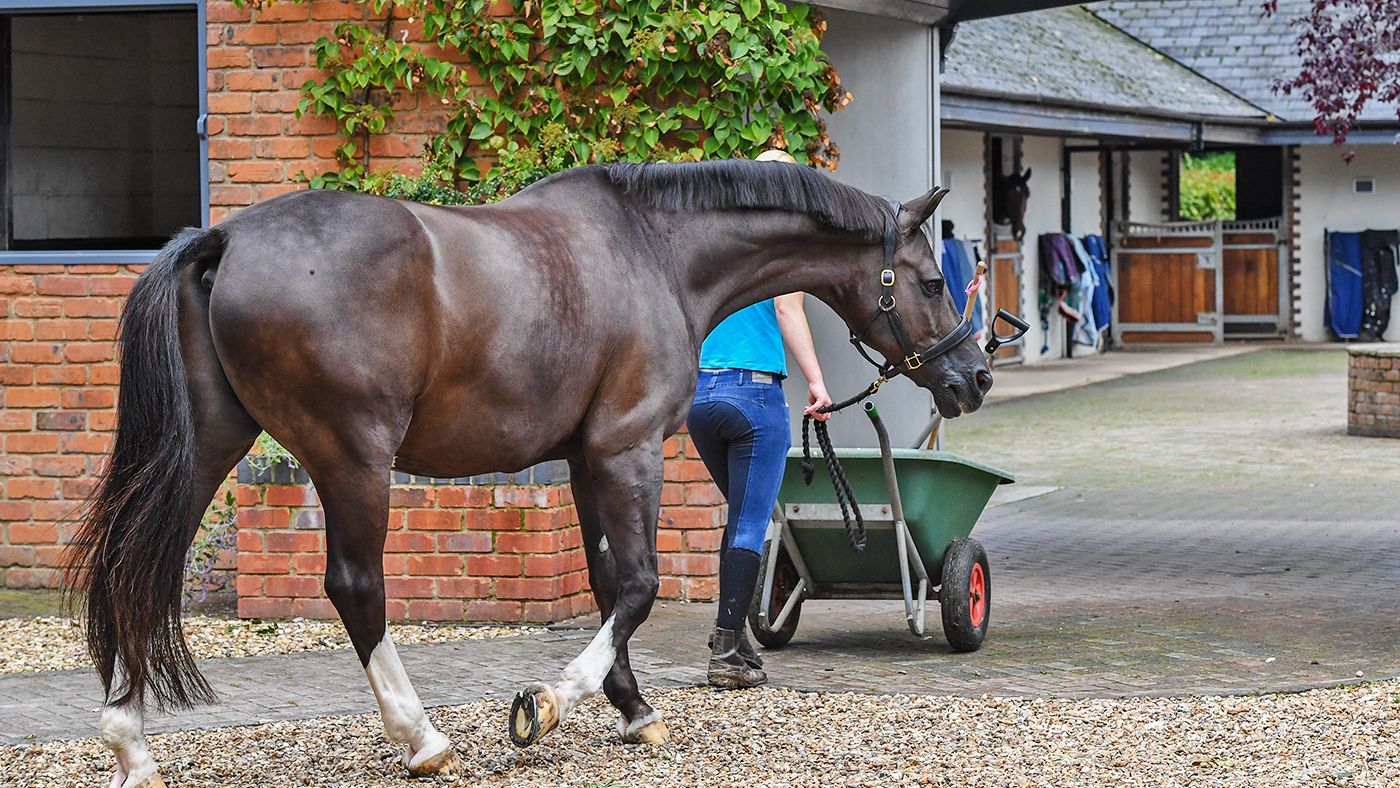
Valegro is still enjoying his retirement at Carl Hester yard in Gloucestershire.
Carl’s horses also go hacking from home, are led out in hand, visit the water treadmill at Hartpury, and are taken out in the lorry for rides “so they have a relaxed attitude to going out”. He reminds us that “education is not always about competing”.
Carl Hester on keeping horses happy
While prioritising a natural lifestyle, how else does Carl Hester keep his horses happy? “The thing I would say about horses that have come from no turnout, or you know, constant schooling, is that it can really deaden their personality,” he says. He also believes it is vital that horses can interact with one another: “In my yard they can touch each other in the stables, and they are turned out together so they are never isolated. That interaction with another horse – it just brings out their personality.”
Aside from horse care, what advice does Carl offer for the aspiring competition rider? “People need to realise how long a training programme is – years and years. You can’t get there on a quick fix,” he says, while experience is a benefit in any equestrian discipline. “It’s not a sport where older people will disappear in their 30s because they are too old or too stiff. It really is a sport where the more experience you gain, the more you go on.”
He suggests younger riders tap into the knowledge of their elders: “First, try and get yourself to a base where you can observe and learn from people you respect and admire. The biggest mindset change for me was when I got my head around the fact you have got to put in the years and time and start training your own horses. When you start doing that, you start understanding everything – you become a horse person, rather than just a horse rider.”
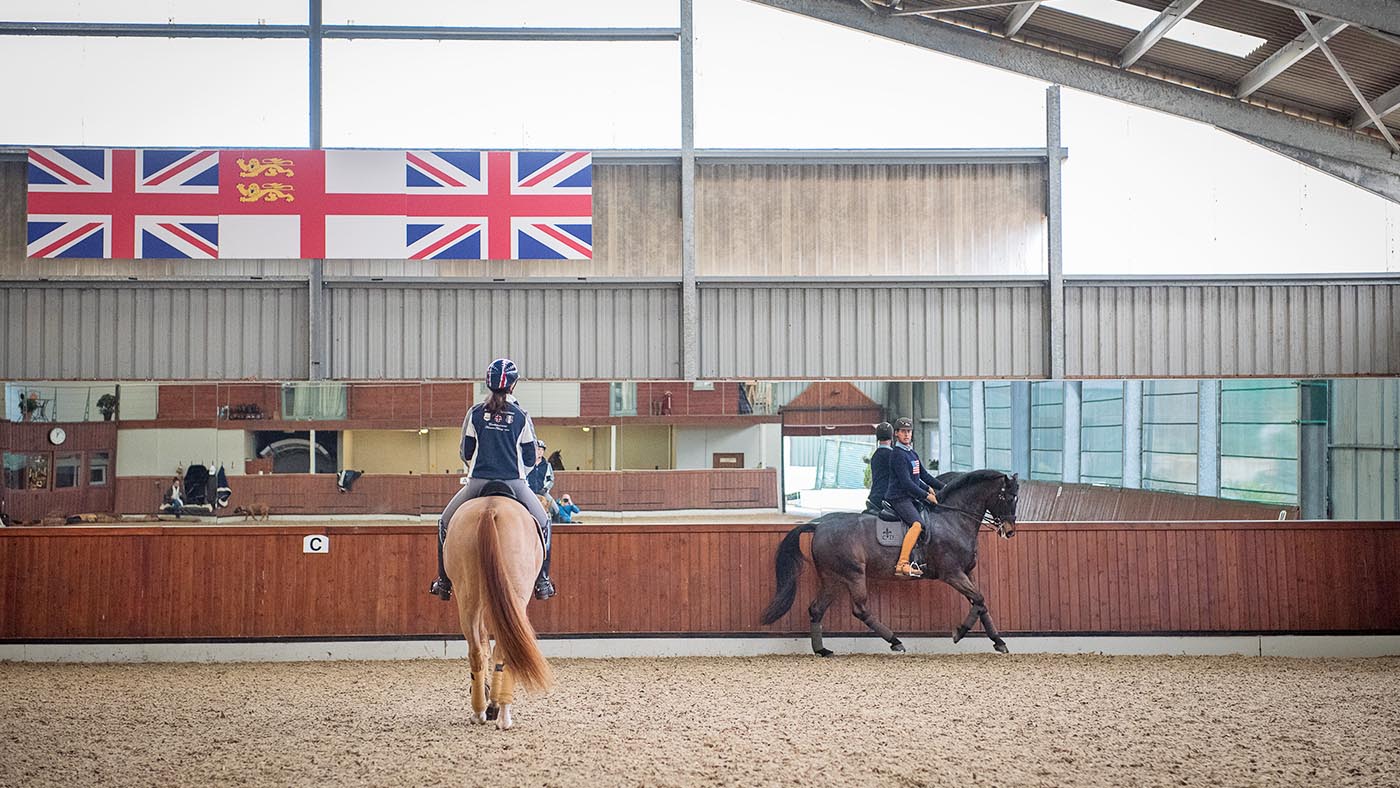
Charlotte Dujardin and Gio train alongside Carl Hester and Hawtins Delicato at home in 2018.
For Carl Hester, it’s all about the training. “As a competitor, your aim is grand prix and it’s going to take you, especially with your first horse, something like six, seven, eight years to actually train a horse to the highest levels. Of course, that feels like a million miles away when you’re really young, but it’s not, it goes really quickly,” he adds enthusiastically. “And you can learn from every horse. Even the ones that aren’t so talented can be taught to do a bit of everything towards grand prix.”
Any pupil is extremely lucky to get to train with Carl Hester – but he believes the relationship is mutually beneficial. Students, he says, “are really good for your own personality. You just have to realise that everybody is trying to get better. People don’t come for lessons to not do what you say. Progress is often small and plateaus at times, but that is more than enough for some. It doesn’t always have to be in leaps and bounds.”
Advice on buying horses
As for buying horses, while the market is incredibly buoyant at the moment, Carl Hester cautions that throwing vast sums of money around “doesn’t mean the horse is going to be talented enough to get there, or stay sound, or have the will to do it”. His theory is to enjoy training the horse, but be sure to be in an economic position that if it goes wrong, huge amounts of cash aren’t lost.
Famously Carl bought Valegro for £4,000, but he highlights that the market was very different 20 years ago, saying that, at the time Valegro’s price tag was not a one-off. Although, that isn’t to say keeping your eyes peeled for a good price today is a waste of time, and in his own words, “who isn’t always on the hunt for a bargain?”.

Carl Hester waves to the crowd after an excellent grand prix test on Fame at the European Dressage Championships in Riesenbeck.
Looking ahead, Carl is delighted with his current top mount, Fame, who helped the European team to team gold and “really gave his all this year”.
He’s also got a couple of young horses, yet to be seen and unnamed, that he is also excited about. One is a six-year-old by Utopia and the other is a five-year-old called Eskimo at home, who is 18 hands and currently being ridden by Sadie Smith.
As per usual, Carl Hester is the perfect combination between philosophical and optimistic, saying: “What we must remember with young horses is they are all dreams – but I’m dreaming big at the moment.”
Did you enjoy reading this exclusive interview with Carl Hester? We used the support we receive from our website subscribers to create this article. If you’d like to support our work, enabling us to invest in even more exclusive journalism like this – as well as enjoying unlimited access to our online breaking news service, expert opinion and event analysis, our extensive vet library, plus training advice, you can subscribe today from as little as £1 a week*. View offers.
*Annual subscription billed today as £52 for 1 year. Renews automatically after first year at standard price £87.99, and we will notify you of any price increases in advance. Cancel auto-renewal at any time.
Read more about Carl Hester:

Pammy Hutton: ‘How can we ensure Carl Hester gets the knighthood he deserves?’

‘I loved every moment we had together’: Remembering the big-hearted horse who made Carl Hester a better rider

‘I can’t believe he was that good’: Carl Hester’s first freestyle on Fame earns career-high score at Europeans

‘I hear them doing the Grand National at night!’ Carl Hester on the joys (and worries) of top horses living out

‘It’s still a thrill to win’: Carl Hester crowned British national champion for the 11th time


